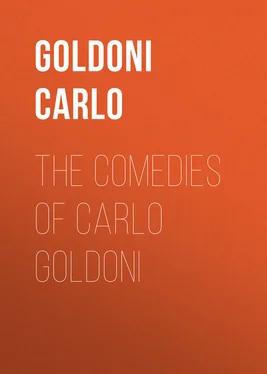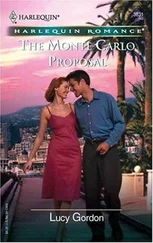Carlo Goldoni - The Comedies of Carlo Goldoni
Здесь есть возможность читать онлайн «Carlo Goldoni - The Comedies of Carlo Goldoni» — ознакомительный отрывок электронной книги совершенно бесплатно, а после прочтения отрывка купить полную версию. В некоторых случаях можно слушать аудио, скачать через торрент в формате fb2 и присутствует краткое содержание. Жанр: foreign_antique, foreign_prose, foreign_dramaturgy, на английском языке. Описание произведения, (предисловие) а так же отзывы посетителей доступны на портале библиотеки ЛибКат.
- Название:The Comedies of Carlo Goldoni
- Автор:
- Жанр:
- Год:неизвестен
- ISBN:нет данных
- Рейтинг книги:5 / 5. Голосов: 1
-
Избранное:Добавить в избранное
- Отзывы:
-
Ваша оценка:
- 100
- 1
- 2
- 3
- 4
- 5
The Comedies of Carlo Goldoni: краткое содержание, описание и аннотация
Предлагаем к чтению аннотацию, описание, краткое содержание или предисловие (зависит от того, что написал сам автор книги «The Comedies of Carlo Goldoni»). Если вы не нашли необходимую информацию о книге — напишите в комментариях, мы постараемся отыскать её.
The Comedies of Carlo Goldoni — читать онлайн ознакомительный отрывок
Ниже представлен текст книги, разбитый по страницам. Система сохранения места последней прочитанной страницы, позволяет с удобством читать онлайн бесплатно книгу «The Comedies of Carlo Goldoni», без необходимости каждый раз заново искать на чём Вы остановились. Поставьте закладку, и сможете в любой момент перейти на страницу, на которой закончили чтение.
Интервал:
Закладка:
Phil. Here again my philosophy explains everything. Suppose, by chance, the young lady of whom he is enamoured were rich, dependent on her father, and could not encourage his hopes; would it be strange if despair counselled him to leave her?
Gian. [ Aside. ] He seems to know all.
Phil. And this tremor of the limbs, occurring just as he is to set out, must, I should say, viewed philosophically, arise from the conflict of two opposing passions.
Gian. [ Aside. ] I could imprecate his philosophy!
Phil. In short, the benevolence of my character, hospitality, to which my heart is much inclined, humanity itself, which causes me to desire the good of my neighbours, all cause me to interest myself in him; but I would not wish my daughter to have any share in this disease.
Gian. Ah, you make me laugh! Do I look thin and pale? am I melancholy? What says your philosophy to the external signs of my countenance and of my cheerfulness.
Phil. I am suspended between two opinions: you have either the power of self-control, or are practising deception.
Gian. Have you ever found me capable of deception?
Phil. Never, and for that reason I cannot believe it now.
Gian. You have determined in your own mind that the officer is in love, which is very likely; but I am not the only person he may be suspected of loving.
Phil. As the Lieutenant leaves our house so seldom, it is fair to infer his disease had its origin here.
Gian. There are many handsome young ladies who visit us, and one of them may be his choice.
Phil. Very true; and, as you are with them, and do not want wit and observation, you ought to know exactly how it is, and to relieve me from all suspicion.
Gian. But if I have promised not to speak of it?
Phil. A father should be excepted from such a promise.
Gian. Yes, certainly, especially if silence can cause him any pain.
Phil. Come, then, my good girl, let us hear. – [ Aside. ] I am sorry I suspected her.
Gian. [ Aside. ] I find myself obliged to deceive him. – Do you know, sir, that poor Monsieur de la Cotterie loves to madness Mademoiselle Costanza?
Phil. What! the daughter of Monsieur Riccardo?
Gian. The same.
Phil. And does the girl return his affection?
Gian. With the greatest possible ardour.
Phil. And what obstacle prevents the accomplishment of their wishes?
Gian. Why, the father of the girl will hardly consent to give her to an officer who is not in a condition to maintain her reputably.
Phil. A curious obstacle, truly. And who is this Monsieur Riccardo, that he has such rigorous maxims? He is nothing but a broker, sprung from the mud, grown rich amid the execrations of the people. Does he think to rank himself among the merchants of Holland? A marriage with an officer would be an honour to his daughter, and he could not better dispose of his ill-got wealth.
Gian. It seems, then, if you were a broker, you would not refuse him your daughter?
Phil. Assuredly not.
Gian. But, being a Dutch merchant, the match does not suit you?
Phil. No, certainly not; not at all – you know it very well.
Gian. So I thought.
Phil. I must interest myself in behalf of Monsieur de la Cotterie.
Gian. In what manner, sir?
Phil. By persuading Monsieur Riccardo to give him his daughter.
Gian. I would not advise you to meddle in the affair.
Phil. Let us hear what the Lieutenant will say.
Gian. Yes, you should hear him first. – [ Aside. ] I must give him warning beforehand.
Phil. Do you think he will set out on his journey immediately?
Gian. I know he has already ordered his horses.
Phil. I will send directly to see.
Gian. I will go myself, sir. – [ Aside. ] I must take care not to make matters worse.
[Exit.Phil. [ Alone. ] I feel I have done injustice to my daughter in distrusting her; it is a happiness to me to be again certain of her sincerity. There may be some concealed deception in her words, but I will not believe her so artful; she is the daughter of a man who loves truth, and never departs from it, even in jest. Everything she tells me is quite reasonable: the officer may be in love with Mademoiselle Costanza; the absurd pride of the father considers the match as far below what his daughter is entitled to. I will, if possible, bring about the marriage by my mediation. On the one hand, we have nobility reduced in circumstances; on the other, a little accidental wealth; these fairly balance one another, and each party will find the alliance advantageous.
Mar. Isn't my mistress here, sir?
Phil. She is just gone.
Mar. By your leave. [ Going. ]
Phil. Why are you in such haste?
Mar. I am going to find my mistress.
Phil. Have you anything of consequence to say to her?
Mar. A lady has asked for her.
Phil. Who is she?
Mar. Mademoiselle Costanza.
Phil. Oh! is Mademoiselle Costanza here?
Mar. Yes; and I suspect, by her coming at this unusual hour, that it is something extraordinary that brings her here.
Phil. I know what this extraordinary something is. [ Smiling. ] Say to Mademoiselle Costanza, that, before going to my daughter's room, I will thank her to let me see her here.
Mar. You shall be obeyed, sir.
Phil. Is the officer in?
Mar. No, sir, he is gone out.
Phil. As soon as he returns, ask him to come to me in this room.
Mar. Yes, sir. Do you think he will go away to-day?
Phil. I am sure he will not.
Mar. Indeed, his health is so bad, that it would be dangerous for him to proceed on his journey.
Phil. He shall remain with us, and he shall get well.
Mar. My dear master, you alone have the power of restoring him to health.
Phil. I? How! do you know what is the Lieutenant's disease?
Mar. I know it; but do you, sir?
Phil. I know everything.
Mar. Who told you?
Phil. My daughter.
Mar. Indeed! [ With an expression of surprise. ]
Phil. Why are you surprised? Would not my daughter be wrong to conceal the truth from her father?
Mar. Certainly; she has acted most wisely.
Phil. Now we can find the remedy.
Mar. In truth, it is an honourable love.
Phil. Most honourable.
Mar. The Lieutenant is an excellent young man.
Phil. Most excellent.
Mar. It is his only misfortune that he is not rich.
Phil. A handsome fortune with his wife would indeed make his situation more comfortable.
Mar. If the father is satisfied, no one has a right to complain.
Phil. A father with an only child, when he finds an opportunity of marrying her respectably, ought to be pleased to avail himself of it.
Mar. May God bless you! these are sentiments worthy of so good a man. I am delighted both for the officer and the young lady. – [ Aside. ] And not less so for myself, as my beloved Gascoigne may now remain with me.
[Exit.Phil. [ To himself. ] Good actions deserve praise, and every person of sense will approve of what I am doing.
Читать дальшеИнтервал:
Закладка:
Похожие книги на «The Comedies of Carlo Goldoni»
Представляем Вашему вниманию похожие книги на «The Comedies of Carlo Goldoni» списком для выбора. Мы отобрали схожую по названию и смыслу литературу в надежде предоставить читателям больше вариантов отыскать новые, интересные, ещё непрочитанные произведения.
Обсуждение, отзывы о книге «The Comedies of Carlo Goldoni» и просто собственные мнения читателей. Оставьте ваши комментарии, напишите, что Вы думаете о произведении, его смысле или главных героях. Укажите что конкретно понравилось, а что нет, и почему Вы так считаете.












